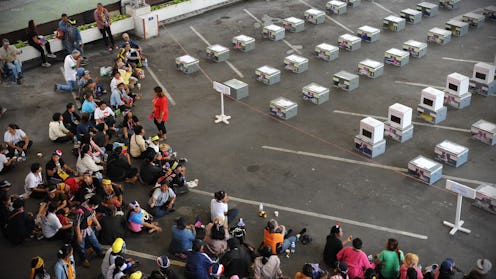News
Thailand's National Elections Haven't Been Violent
Fears of a bloody Sunday during Thailand's national elections proved unfounded, as voting took place in spite of the continued presence of protestors. Although anti-government demonstrators managed to stop the ballots in parts of Bangkok, as well as certain provinces in the south, 89 percent of the polling stations were able to operate normally. Still, it's unlikely the snap election will do much to stem the rapidly growing violence in the country — even if it does manage to legitimize Prime Minister Yingluck Shinawatra's administration.
Although hundreds of polling stations in the country were forced to either close or not open at all thanks to demonstrators, the vast majority stayed open and functioned normally. In spite of this, those demonstrating against the elections remain steadfast that their efforts to derail the parliamentary polls haven't been in vain: protest leader Suthep Thaugsuban told the BBC that the closures would mean the government would be unable to declare a result, and that "therefore the election is a waste of time and money."
Thai anti-government forces, led in large part by the People’s Democratic Reform Committee (PDRC), have been protesting since November, after a controversial amnesty bill — which would have allowed Yingluck’s brother, ousted premier Thaksin Shinawatra to come back to the country — passed the lower houses of parliament. The opposition are calling for Yingluck's allegedly corrupt government to step down, so they can put in place their own non-elected “people’s council.” Their worry is that Yingluck’s party, Pheu Thai — which is widely supported by the poorer, rural areas of Thailand — will win the elections again, and continue to be controlled from afar by Thaksin.
In spite of this, Yingluck maintains that holding Sunday's general election was "the right way under the democratic process" to stem the unrest. "I think sometimes when we have conflicts of different opinions, the only one way for the peaceful [resolution], is we use the vote of the people, like an election," she said.
Knowing they have very little chance of winning at the polls, opposition forces have boycotted the ballot box and held demonstrations, as violence continues to simmer. Just under two weeks ago — after two grenade attacks and nine deaths — the government imposed a 60-day state of emergency for the city, effectively allowing the government to censor media, place curfews, use military force to quell violence, break up gatherings, and detain suspects without charge. And only yesterday, a gunfight broke out outside a building holding ballot papers, leaving seven people injured and the country braced for chaos.
